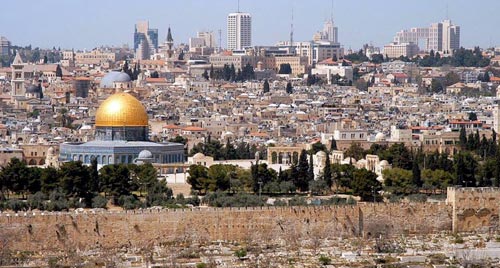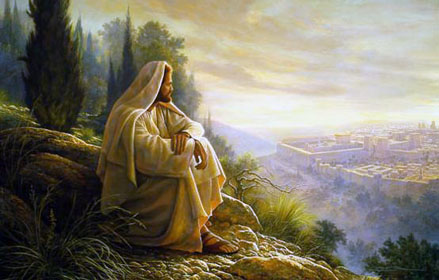December 2011 - Vol. 55
In the midst of all that is going on in the various countries of the Middle East, the Arab Spring, I must honestly say that on a human level I have no hope for peace there in the Holy Land. All the efforts of the political powers over the years have led to a worsening of the situation. Does this mean that I am without hope? Not at all. I am full of hope because I have a different way of looking at the Holy Land, namely the biblical way, and this way is full of hope. When I look at the Holy Land from a political point of view, I don’t know what is happening. Recently a senator friend told me that the longer she is in politics, the less sure she is about what is true. What is true in the Holy Land? As a simple example, during the Palestinian Intifada, journalists sat comfortably in the American Colony Hotel reading the local papers on which they based their articles. Can this count as accurate firsthand reporting, especially when politicians use the media for their own agenda? However, from a biblical view I think I can see what’s going on from a broader spiritual context. It is the battle between God and Satan, between good and evil. One weekend when I was making my way to my house in the Jerusalem suburb of Beit Hanina, I saw a young man accosted by an Israeli special unit. He was stripped and, although there was no evidence of anything, one of the officers killed the young man with a gunshot to the head. The next day, the papers reported that another Palestinian suicide bomber had been stopped. On the following Sunday, I heard a gunshot at the checkpoint that was about 100 yards from my home. An 11-year-old schoolboy had been shot. He was lying on the ground still alive when they flipped him over with a robot to check for explosives, but found none. Five hours or so later, when the boy finally died, the ambulance that had been in attendance all the while was allowed to take him away. The next day, the news reported that another suicide bomber had been stopped. It turned out the boy was deaf and mute and thus had not heard the soldier who commanded him to stop. During the weekend, seeing what I’d seen, I was filled with anger. I began to read the prophet Daniel and asked myself, “Who can I call to stop this senseless folly, and realized that there is no one who can halt it. At that point I understood the words of St. Paul: “It is not flesh and blood that we fight against, but the principalities and powers of darkness in the heavenly places.” The battle is much bigger than the Israelis, the Palestinians, and the world powers. And Satan wants the Christians out of the region. When Palestinian terrorists fire on an Israeli settlement, and the Israelis fire their rockets back, Christian homes have often been destroyed — not because they want the Christians out, but Christians always “happen” to be in the wrong place. Satan certainly wants to keep Christians from letting their light shine. No one, for instance, can accuse the United States of being anti-Christian. But why were its atomic bombs dropped on Hiroshima and Nagasaki, the only Catholic communities in Japan? The Christians just “happened” to be in the wrong spot. In the battle between God and Satan, God made a covenant of peace with Abraham and his descendants. Scripture talks about a covenant of salt (Numbers 18:19). This is a custom in the Arab culture and Arabs still refer to people eating salt together as a sign of friendship. When two friends fight, people will say, “Didn’t they eat salt together?” God established this relationship with Abraham and his offspring. First, there is Abraham’s son Ishmael. You recall that Abraham and Sarah were already old and, as was the custom among the people, when the wife was infertile she would offer her maid to the husband so he could have offspring. It was thus that Ishmael was born through whom the Muslims trace their origin. Of him Scripture says, he will be “a wild horse of a man, his hands against every man and every man against him” (Genesis 16:12). But God loved him and blessed him and his descendants, promising them to become a multitude of nations. Therefore, if we fight Muslims we fight God who has promised to bless them (I am not talking about terrorists, who blaspheme by invoking the name of God). Secondly, there is Isaac, the son of the promise. It is with him that God established an everlasting covenant, meaning it is through his descendants that the Prince of Peace was to come into the world. The descendants of Isaac are also not without problems. God said of them as He spoke to Jacob, “you have striven with God and men, and have prevailed.”
It is of the Jewish people that Jesus was born as a son of Abraham. He is the Prince of Peace. What is peace? Paul in his epistles to the Ephesians and to the Colossians tells us that peace is our reconciliation with God, and therefore with one another. As those who believe in Jesus, we Christians hold the key to peace, namely the forgiveness of sins. Forgiveness of sins is the heart of our faith; without it, there would be no Christianity. Although Jews and Muslims talk about forgiveness, it is not central to their faiths. In fact, their greatest virtue is “honor” – that is, honor of the nation, the race, the tribe, the family. When you do something to my family, woe to me if I don’t take revenge. I have to show that I honor my race, tribe, or family. The Christian witness through forgiveness even of our enemies is crucial for peace. Peace will come, “not by might, not by power, but by my Spirit,” says the prophet Zecheraiah. One of my frustrations is the frequent talk about the numbers of Christians in the Holy Land. But as Maronite Patriarch Bechara Peter Rai told journalists recently, whether we are a large number or a small number, all that matters is that the church is there. David’s greatest sin was not his affair with Bathsheba, as bad as that was, but God punished David more severely after he took a census of his people. By this act he showed that his trust was not in God, but in manpower. It was very displeasing to God. In Scripture, we see that God fights the battle. He fought pharaoh as the people were being led through the Red Sea. He conquered Jericho as the people processed around the city seven times. He fought the battles around Jerusalem, when the warring enemies of Israel slaughtered one another. The battle of Midian is a beautiful example of how God fights. He told Gideon that his army was too large, and ordered him to send home those who were afraid. But still there were too many, so God had Gideon make a selection by ordering people to drink water from the river. Only those who were scooping up the water with their hands while keeping their eyes on the surroundings were chosen: a mere 300 men who were then instructed to surround the enemy camp holding jars with candles in them. Thus, the battle was won through people who were vigilant, obedient, and filled with the fire of God’s Spirit. Why then do we count the number of Christians remaining in the Middle East? Isn’t it ironic that Caesar Augustus conducted a census when Jesus, the Prince of Peace, was born? Let those who are fearful in the Holy Land go, and let God select “a remnant.” Scripture talks about a remnant from which Jesus was born. It will be a remnant from which peace will come. On that horrible weekend when I sought refuge in Scripture and began to read the prophet Daniel, I began to understand what God said to Belshazzar, “You have been weighed in a balance and found wanting,” and that very night Belshazzar died and his kingdom was given to another. And a peace came upon me that has not left me. A peace that has helped me to get some distance from the situation, as if indifferent but not so. I realized then that peace will come from above, just like it had come to me. God asks of us that we pray for this peace to come, and that he would strengthen the Christian remnant in Jerusalem and all the Holy Land so that they may be aflame with the fire of the Holy Spirit, and to watch and pray. For peace will come to Jerusalem and thus spread throughout the world. [Fr. Guido Gockel is Vice President for the Middle East and Europe division of the Catholic Near East Welfare Association and has lived and served in the Holy Land for a number of years.] . |
. | |
|
publishing address: Park Royal Business Centre, 9-17 Park Royal Road, Suite 108, London NW10 7LQ, United Kingdom email: living.bulwark@yahoo.com |
. |

